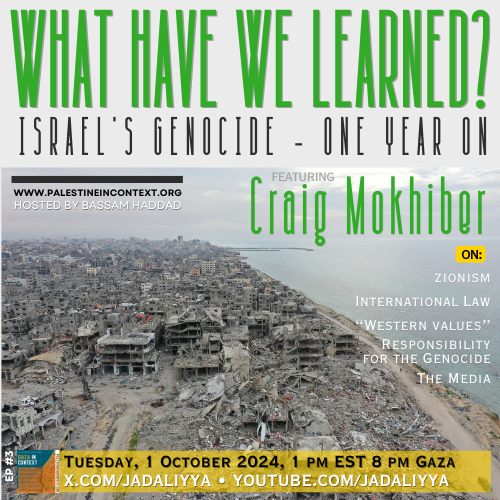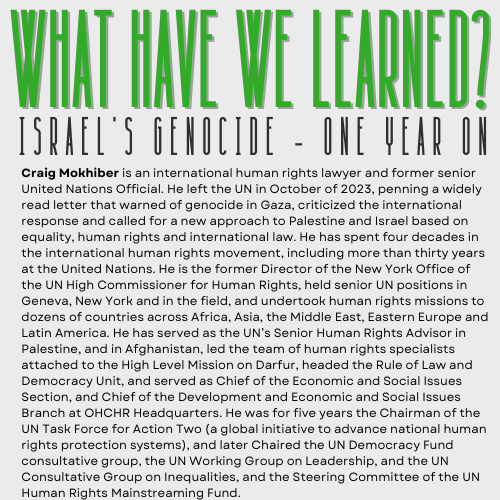Gaza in Context: A Collaborative Teach-In Series
What Have We Learned?
Israel’s Genocide — One Year On
Featuring:
Craig Mokhiber
Hosted by:
Bassam Haddad
Tuesday, 1 October 2024
1:00 PM EST | 8:00 PM Palestine
Join our third edition of “What Have We Learned?” after one year of Israel’s Genocide with Ussama Makdisi, hosted by Bassam Hadddad. Scholars, journalists, activists, and authors select 5 themes/topics and analyze what we have learned about them.
Gaza in Context Project is billing this series as lessons learned, one year on, to break through the fog of observations, narratives, data, propaganda, and images we unfathomably continue to access/witness every day. These conversations are relatively short, intense, and insightful, delivered by thoroughly engaged speakers. Catch our next Episode this week with Ussama Makdisi.
Gaza in Context Collaborative Teach-In Series
We are together experiencing a catastrophic unfolding of history as Gaza awaits a massive invasion of potentially genocidal proportions. This follows an incessant bombardment of a population increasingly bereft of the necessities of living in response to the Hamas attack in Israel on October 7. The context within which this takes place includes a well-coordinated campaign of misinformation and the unearthing of a multitude of essentialist and reductionist discursive tropes that depict Palestinians as the culprits, despite a context of structural subjugation and Apartheid, a matter of consensus in the human rights movement.
The co-organizers below are convening weekly teach-ins and conversations on a host of issues that introduce our common university communities, educators, researchers, and students to the history and present of Gaza, in context.
Co-Organizers: Arab Studies Institute, Georgetown University’s Center for Contemporary Arab Studies, George Mason University’s Middle East and Islamic Studies Program, Rutgers Center for Middle Eastern Studies, Birzeit University Museum, Harvard’s Center for Middle Eastern Studies, Brown University’s Center for Middle East Studies, University of Chicago’s Center for Contemporary Theory, Brown University’s New Directions in Palestinian Studies, Georgetown University’s Center for Muslim-Christian Understanding, Simon Fraser University’s Centre for Comparative Muslim Studies, Georgetown University-Qatar, American University of Cairo’s Alternative Policy Studies, Middle East Studies Association’s Global Academy, University of Chicago’s Center for Middle Eastern Studies, CUNY’s Middle East and Middle Eastern American Center, University of Illinois Chicago’s Arab american cultural Center, George Mason University’s AbuSulayman’s Center for Global Islamic Studies, University of Illinois Chicago’s Critical Middle East Studies Working Group, George Washington University’s Institute for Middle East Studies, Columbia University’s Center for Palestine Studies, New York University’s Hagop Kevorkian Center for Near Eastern Studies


Featuring
Craig Mokhiber is an international human rights lawyer and former senior United Nations Official. He left the UN in October of 2023, penning a widely read letter that warned of genocide in Gaza, criticized the international response and called for a new approach to Palestine and Israel based on equality, human rights and international law. He has spent four decades in the international human rights movement, including more than thirty years at the United Nations. He is the former Director of the New York Office of the UN High Commissioner for Human Rights, held senior UN positions in Geneva, New York and in the field, and undertook human rights missions to dozens of countries across Africa, Asia, the Middle East, Eastern Europe and Latin America. He has served as the UN’s Senior Human Rights Advisor in Palestine, and in Afghanistan, led the team of human rights specialists attached to the High Level Mission on Darfur, headed the Rule of Law and Democracy Unit, and served as Chief of the Economic and Social Issues Section, and Chief of the Development and Economic and Social Issues Branch at OHCHR Headquarters. He was for five years the Chairman of the UN Task Force for Action Two (a global initiative to advance national human rights protection systems), and later Chaired the UN Democracy Fund consultative group, the UN Working Group on Leadership, and the UN Consultative Group on Inequalities, and the Steering Committee of the UN Human Rights Mainstreaming Fund.
Bassam Haddad (Host) is Founding Director of the Middle East and Islamic Studies Program and Associate Professor at the Schar School of Policy and Government at George Mason University. He is the author of Business Networks in Syria: The Political Economy of Authoritarian Resilience (Stanford University Press, 2011) and co-editor of A Critical Political Economy of the Middle East (Stanford University Press, 2021). Bassam is Co-Founder/Editor of Jadaliyya Ezine and Executive Director of the Arab Studies Institute. He serves as Founding Editor of the Arab Studies Journal and the Knowledge Production Project. He is co-producer/director of the award-winning documentary film, About Baghdad, and director of the acclaimed series Arabs and Terrorism. Bassam is Executive Producer of Status Podcast Channel and Director of the Middle East Studies Pedagogy Initiative (MESPI). He received MESA's Jere L. Bacharach Service Award in 2017 for his service to the profession. Currently, Bassam is working on his second Syria book titled Understanding The Syrian Tragedy: Regime, Opposition, Outsiders (forthcoming, Stanford University Press).
